According to the Totally Real documentation I signed when I volunteered my time for Daily Worker Placement, I am contractually obligated to write a “Best of the Year” list. I do enjoy writing these types of pieces, but I want to do things my way. This is not going to be a “Top 5” or anything, but more of a random mix of board game topics so I can talk about what I want to!
Best Board Game of the Year (By Default): Bohnanza: 25th Anniversary Edition (2022)
What determines what’s eligible for a “best of [Given Year]” list? A lot of people will argue that it’s new releases that are marked for that year. But, what does “new” even mean? This version of Bohnanza, a game originally released in 1997, has a collector’s coin, a postcard with Uwe Rosenburg on it, and a whole new bean type. That’s new enough for me to squeeze in another chance to spread the praises of Bohnanza.

See? A metal coin and two postcards! It’s a whole new game!!
Bohnanza, for those of you living under a beanfield-sized rock, is a game about trading beans. You start the game with a handful of beans of all shapes and sizes, and on your turn you must play beans from the front of your hand, and you cannot ever arrange the beans you have in your hand of cards. This means if your play area of two bean fields are full, and no cards in your hand match those beans, you must either harvest those fields, sometimes way before they’re ready to be harvested, or you can trade the beans in your hand to your opponents to let the bean albatross you have in your hand fly away.
Bohnanza is a perennial classic for many reasons, but mainly due to its simplicity. The rules are so simple that the previous paragraph has most of them covered. That’s important to get a family-weight game to reach enormous heights, but not the end-all-be-all factor. Because the rules are so simple, they get out of the way so you can focus on dumping your Green Beans on your grandma so you can win the game, instead of asking “wait, which phase of the moon gives me a +1 bonus to Stink Bean production?” If you have not played Bohnanza, this is easily the version you should play. Especially for that sick Uwe merch.
The Wet Fart Award: Capstone’s Rise & Catherine: The Cities of the Tsarina
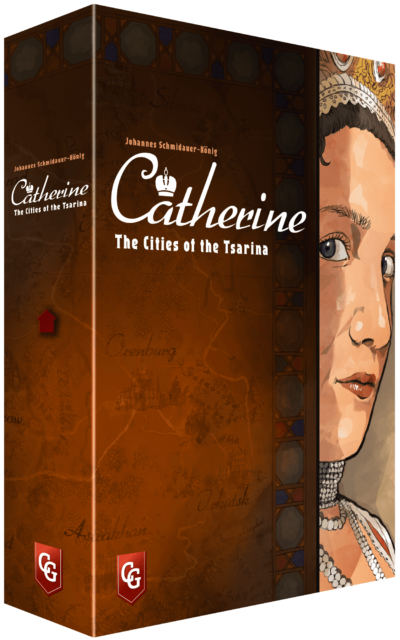
Capstone Games had a killer 2021: Ark Nova, the 4th best game of all time apparently; Boonlake, their second Pfister; Terra Mystica, keeping one of the best games of all time in print; Coffee Traders, a messy Lacerda-like that still deserves repeat plays; Imperial Steam, a game lauded in 2021 for being one of the best heavy games released; and Glass Road, again keeping a beloved classic in print.
2022 has a completely different feel from their output. They did swing for the fences and acquire the publishing rights for Viard’s Clinic: Deluxe Edition, which honestly shocked me. And they dipped their toes in the wargame publishing market with Fire & Stone: Siege of Vienna 1683, designed by Robert DeLeskie, a designer whose works were only ever published by Hollandspiele before. And they’ve done Beer & Bread and Terra Nova, lighter games I’ve not had the chance to try, and may be below my interest level anyway.
But their other tentpole releases were Catherine: The Cities of the Tsarina and Rise.
A note regarding Catherine: This game has been met with heavy criticism due to its questionable implementation of theme and historical inaccuracies. Believe it or not, a game where you are vying for the affection of the leader of Russia in 2022 just feels weird! This is a topic that I am underinformed in, and while still full of a lot of internet vitrial, this thread on BGG breaks down the information clearer and more concise than I ever could. I’d recommend reading through it to at least get a better understanding of where people are coming from. I am not going to comment on this issue further, not because I think the theme is not important in this case, but because I want to focus on the mediocre gameplay and not get hung up on its tone-deaf themeing.
In Catherine, you are playing dual use cards in two different rows to activate the top or the bottom of the card to do… whatever the card dictates. It’s mostly just resource gaining or conversion to other resources or victory points. It’s ever so slightly an engine builder because you can activate cards in certain spots more than once. Outside of that though, the game is frustratingly simple: play a card, do the thing, go home. It’s not that the simplicity of the game is inherently bad: I think most games are overwrought with unnecessary rules and systems nowadays. But, Catherine suffers from a lack of autonomy. There’s often only one efficient choice to make on your turn due to the way the cards are laid out. An extension of the lack of autonomy is there is almost no player interaction either, due to the cards being drawn being entirely random, so again, there’s just so little that you can do on your turn, and so little for you to think about, that you should just box the game up and play Chutes and Ladders.
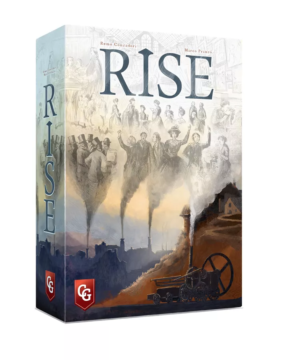
Rise has a similar issue to Catherine in that its theme is somehow both completely unnecessary, and yet still offensive. Rise is nowhere near as egregious: it’s simply another demonstrably exploitive send-up of the Industrialists that forever ruined this country. Outside of the generic factory theme, the game is literally just a bunch of tracks you progress up. That’s not me being dismissive: I literally read the BoardGameGeek description and the back of the box. Between those two item descriptions, “moving up tracks” is mentioned three times. Three!
And this hyperfixation on going up tracks is there because, well, that’s what the game is. You progress up ten(!) tracks to gain victory points and “improve your city”. Hitting certain thresholds cause bonuses to proc, but other than that… That’s the game. It’s what other games would make the side board. It’s what other games would hide under a thick layer of theme. But Rise, for better or worse, wears exactly what it is on its sleeve. In my opinion, even if you enjoy the “progress for the sake of progress” thinking in Euro games, Rise should be avoided at all costs, unless you’re looking for the most boring, lifeless game of the year.
Do these games mean that Capstone itself is doomed? Absolutely not. They know how to choose real winners, and they know how important it is to take chances in this industry. Not only that, but if you look at the other licensing acquisitions they’ve done, it wouldn’t surprise me if Catherine and Rise were part of a packaged deal with dlp games. And many other Euro publishers of the past also have catalogues full of garbage with the occasional gem.
Rapid Fire Recap Time!
Here’s a list of games I still want to play from this year, in the order I want to play them:
15.) Beer & Bread
14.) The Mirroring of Mary King
12.) Verdant
11.) Mosaic: A Story of Civilization
10.) Twilight Inscription
09.) Wayfarers of the South Tigris
07.) Zurmat: Small Scale Counterinsurgency
06.) Framework
05.) Ready Set Bet
04.) Flamecraft
03.) Fire & Stone: Siege of Vienna 1683
02.) Terra Nova
01.) Frosthaven
And here is the definitive, ever-changing, never-permanent top 15 list of 2022!
Well, it is in fact me ranking the fifteen 2022 titles I’ve played. Matter of fact, I really did not like 14 or 15 at all. With that said, this was a phenomenal year for gaming. In a weaker year, any of the top 10 in this list could be number 1.
15.) The Acts of the Evangelists
14.) Hidden Leaders
13.) Dice Realms
12.) Awimbawé
11.) Return to Dark Tower
10.) Galenus
09.) The Old Prince 1871
08.) Cat in the Box: Deluxe Edition
07.) Stonewall Uprising
06.) John Company: Second Edition
05.) Flashpoint: South China Sea
04.) Caesar!: Seize Rome in 20 Minutes!
03.) Carnegie
02.) Splendor Duel
Bailey’s Board Game of the Year: du Bois’ Heading Forward
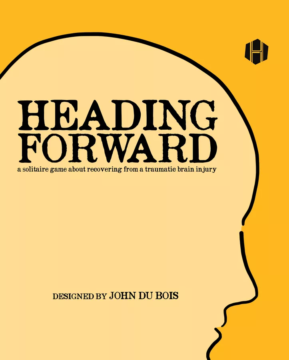
The 89th Academy Awards had a contentious rivalry between two films: Moonlight and La La Land. Moonlight was the indie darling about being black, gay, abused, and poor through three points of the main character’s life. La La Land was the Hollywood film about the history and nostalgia of Hollywood itself. In most years the Academy cannot ignore the power of the self-serving Hollywood film, and would have given the top title to La La Land. In 2016, though, the emotional core of Moonlight surpassed the traditional winner, and Moonlight walked away with the top prize.
This year feels no different for me.
Splendor Duel is, mechanically, a perfect, simple, tight two player game that addresses all the issues with the original game (for two players) and tweaks the system into a game that makes 7 Wonders Duel look like someone’s school project. It’s speedy, snappy, deep, tight, punchy, all while fixing all the trappings of a traditional two player game like turn order and uneven actions. For someone who is “A Heavy Gamer”, Splendor has always held a special place in my heart, and Splendor Duel is no different.
But La La Land didn’t win this year.
Heading Forward is the most emotion-filled game I’ve ever played. It’s the only game whose narrative I’ve internalized and engaged with. It’s brilliant in every single category, and is solid proof that our medium has not even begun to scratch the possibilities of what we can do.
In this solo game, you’re attempting to recover from a traumatic brain injury before your insurance money runs out. The way your recovery is tracked is by spending some of your daily resources to upgrade cards. Take the “Hobby” Card.
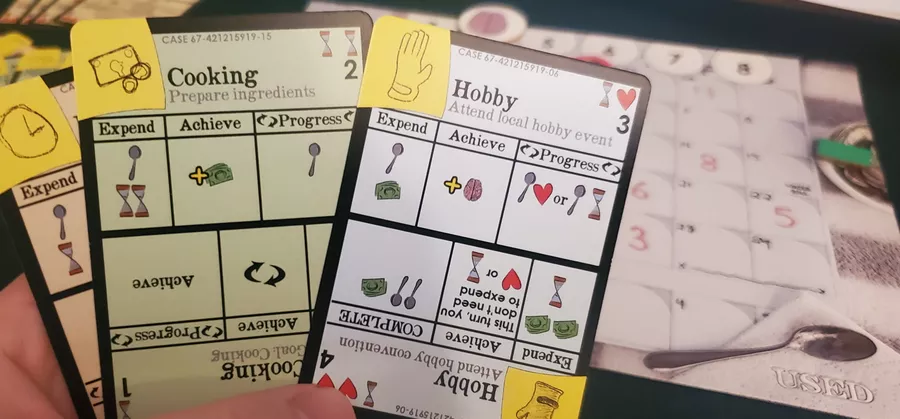
At its third level, your goal is to “Attend local hobby event”. To do so, you must spend a spoon (a metaphor for your physical or mental energy) and some money. If you do, great! You gain the “Achieve” reward, and can even spend the resources under “Progress” to improve that skill. That’s great!
Oh, except if you do not use that card for any reason, then your Hobby skill will atrophy, and you will go down a level in “Hobby”, and the goal of the game is to “Complete” three different colors of cards, thus prolonging your victory.
Oh, and you only go through the deck once each day. But as you gain “Brain”, you get more cards in your hand to pay for more expensive cards!
Oh, but if you draw more cards, your days are shorter, and the chance of atrophying goes way up.
This uphill battle, the struggle behind the game being harder to progress as you become healthier, is the heart of the game. It’s one of the factors that the designer, John du Bois, is most proud of. Yes, the point is to get healthy, but the fact of the matter is, both internally and externally, the better you’re doing, the more you feel how off things are where you aren’t thriving. At some point you aren’t proud of being able to drive again if you’re unable to cook for yourself yet. You don’t care about your interest in hobbies returning to normal if you still can’t hold a job.
It’s in this space that the game becomes its most thematic and the most engrossing. As with recovery itself, the game does start out feeling relatively narrow: I’ll take any improvement I can get. But when you’re balancing hard-to-come-by resources with a larger hand size and upgraded cards, you can really feel the squeeze. One wrong choice and you will not beat the game. One wrong area of focus and you will not meet your recovery timeframe.
And the pièce de résistance of the game? The Trigger Card.
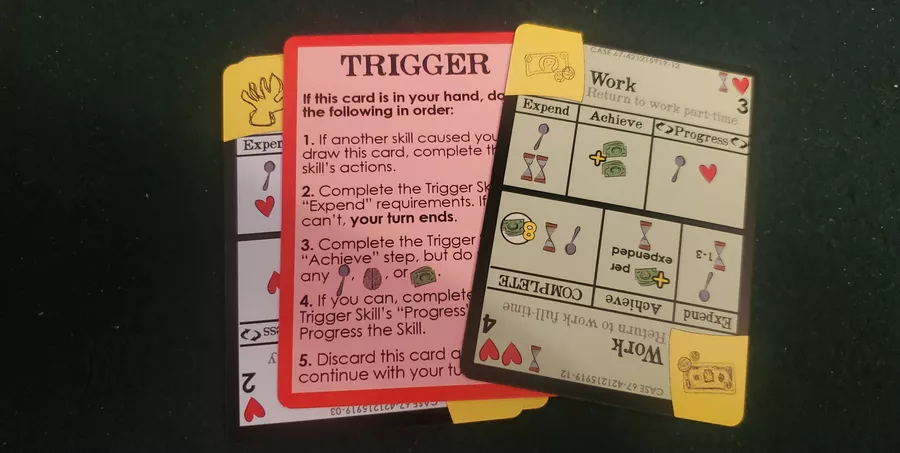
Somewhere in your deck is a card that will, literally and in the universe of the game, trigger you. It will cause you to drop everything and focus on that task. No matter what, you must sacrifice whatever resources you have in order to fulfill this trigger card. And if you cannot, you must discard all of your cards and draw a new hand, thus rapidly progressing time in your day. At the beginning of the game, the requirements are low on this card, but also the price of failure is much lower. Not being able to fulfill the requirements later in the game is one of the harshest gut punches I’ve felt playing a game. The loss of those cards, of that time, is felt.
Without the theme, the game would be spectacular. With the theme, the game is true art. But with a slight extrapolation of the theme, it’s a game that feels made for me.
See, I’ve not had a great year. A game about coping through trauma, about rebuilding one’s self from nothing, about overcoming the harmful triggers, is exactly what I needed. Really, Heading Forward is an optimistic game: its failstate is not death nor lack of recovery, it’s simply that insurance has run out, or more literally, time has run out. Speaking from experience, running out of time is not the end. If I were following the game’s rules in my life, I failed the stated objective: I took much longer than I thought for my own recovery. But recovery is a long, long process. In some ways, I don’t know if I will ever recover from everything I’ve experienced. But I can say that I have maxed out 4 or 5 cards from my deck at this point, and I am back to living life the way I want to be. Not on the original timeframe, but I’m here now, healthy and happy.
Moonlight won Best Picture because of the strong, relatable, emotional core of the film, even when, statistically speaking, those voting for the film were not black, gay, abused, nor poor. Heading Forward is a game loved by many in the community for maintaining its own emotional core, when nearly anyone playing it will not have experienced a traumatic brain injury. But we have experienced abuse, panic attacks, learning disabilities, or even experienced our loved ones recover from brain injuries. And it’s this connectivity, this ability to create this meditative space, that makes Heading Forward the best game of the year, and a damn strong contender for the best board game I’ve ever played.Y’know, behind like Bohnanza or something.
Thank goodness that didn’t come out this year.
[…] Forward was already praised to the skies by Bailey D a couple of weeks ago and I have very little to add to her take except to say that, even if you’re not a fan of either […]